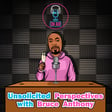
Vanity: Hulk Hogan's Scandal, GOP Evolution, & My Self-Reflection
Join host Bruce Anthony on this episode of Unsolicited Perspectives as he takes you on a journey through the unexpected twists and turns of his mind. Bruce kicks things off with a deep dive into his lifelong passion for professional wrestling, specifically his early idol, Hulk Hogan. But it's not all body slams and leg drops—Bruce pulls no punches as he unpacks how Hogan's use of racial slurs and controversial political remarks shattered his admiration, leaving him disillusioned.
From there, Bruce seamlessly transitions into a historical exploration of the Republican Party's transformation. He traces its evolution from the days of Abraham Lincoln, when it was rooted in opposing the expansion of slavery, to its current state under Donald Trump, marked by a dramatic shift in values and ideology.
But it wouldn’t be an episode of Unsolicited Perspectives without some candid self-reflection. Bruce wraps things up by getting personal, sharing how his vanity—manifested in his obsession with appearance and personal grooming—plays out in his daily life. Whether you're here for the wrestling nostalgia, the political analysis, or the personal insights, this episode offers something for everyone. #UnsolicitedPerspectives #GOPevolution #RepublicanPartyHistory #HulkHogan #vanity
🔔 Hit that subscribe and notification button for weekly content that bridges the past to the future with passion and perspective. Thumbs up if we’re hitting the right notes! Let’s get the conversation rolling—drop a comment and let’s chat about today’s topics.
For the real deal, uncensored and all, swing by our Patreon at patreon.com/unsolicitedperspectives for exclusive episodes and more.
Thank you for tuning into Unsolicited Perspectives with Bruce Anthony. Let's continue the conversation in the comments and remember, stay engaged, stay informed, and always keep an open mind. See you in the next episode!
Chapters
00:00 Welcome to Unsolicited Perspectives
01:00 Bruce's Wrestling Fandom
04:22 Hulk Hogan's Racial Slur Scandal
06:01 Hulk Hogan's Apology Tour and Return
09:41 Hulk Hogan's Offensive Remarks on Kamala Harris
14:24 Hulk Hogan's Comparison to Chris Benoit
19:51 The Evolution of the Republican Party
33:03 The GOP's Economic Policies in the 1920s
34:16 The Great Depression and Its Aftermath
36:41 The New Deal Opposition
39:32 Civil Rights Movement and Party Realignment
46:47 The Rise of the Southern GOP
49:54 Reagan's Influence and the Modern GOP
53:47 Trump's Impact on the Republican Party
57:48 Personal Reflections and Vanity
01:07:09 Closing Remarks and Call to Action
Follow the Audio Podcast:
Apple Podcast: https://podcasts.apple.com/us/podcast/unsolicited-perspectives/id1653664166?mt=2&ls=1
Spotify: https://open.spotify.com/show/32BCYx7YltZYsW9gTe9dtd
www.unsolictedperspectives.com
Beat Provided By https://freebeats.io
Produced By White Hot
